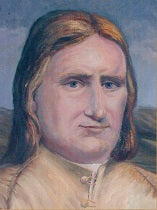The first covenant God made with humanity was established in the very beginning. The terms of this covenant have never been superseded, even though they are largely overlooked by modern Christianity. This covenant between Creator (God) and creature (Homo sapiens) has been the foundation of what we call the “Old” Covenant and it remains the foundation of the New Covenant. Let me briefly trace some of the threads of this covenant that run through both the Old and New Testament scriptures.
When God created man (male and female created he them) he breathed into them the breath of life and they became living beings—in this way we were created in the image of God. The covenant between God and his creation was that we (creature) should live in a dialogic relationship with God (Creator). We should live by the counsel of the Creator and by no other. By this means we are kept living beings, we maintain the image of God.
In the Genesis account of the Garden of Eden, we see the consequences of taking counsel with someone other than the Creator. Man (Adam) and woman (Eve) discarded the image of God, were no longer living beings, and knew themselves to be naked. Immediately they tried to steal life from other organisms to hide their loss. They stitched together “fig leaves,” they wore animal skins; but that lost life was/is not to be found there. Nakedness and the sense of nakedness remains.
Look at what Isaiah had to say: “Woe to the disobedient children who take counsel, but not of Me; who cover themselves; but not with my breath...” (Isaiah 30:1) And to those whose sin was as indelible as scarlet or crimson, Isaiah announced God’s remedy: “Come, let us reason together.” The usual response to sin—sacrifice and cleansing ritual—are only mentioned as something that is a burden to God: “I delight not in the blood of bullocks, or of lambs, or of he goats...incense is an abomination...your new moons and appointed feasts my soul hateth...when ye make many prayers, I will not hear.” (See Isaiah 1:10-18)
When the Israelite people were in front of the mountain that burned with the presence of God, they cried out:
Behold, the LORD our God hath shewed us his glory and his greatness, and we have heard his voice out of the midst of the fire...if we hear the voice of the LORD our God any more, then we shall die.” (Deut. 5:24-25)
God’s response to this statement was:
I will raise them up a Prophet from among their brethren, like unto thee, and will put my words in his mouth; and he shall speak unto them all that I shall command him. And it shall come to pass, that whosoever will not hearken unto my words which he shall speak in my name, I will require it of him. (Deut. 18:18-19)
And so, many prophets were raised up, saying “the word of God came to me...” but we do not see the Prophet like Moses until this Word became flesh (John 1:14). On the Mount of Transfiguration, God spoke from the cloud saying, “This is My Son, My Chosen One; listen to him.” (Luke 9:35). And what does this Prophet like Moses, this chosen one, have to say? “It is the spirit/breath that gives life; the flesh profits nothing; the words that I speak to you are spirit/breath, and they are life.” (See John 6:63). In Genesis, it was stated that God breathed into man the breath of life. In the book of John, we see this breath to be an intelligible Word that speaks to us. Those words are breath and life. Jesus said, “He who hears my word and puts his entire confidence and trust in Him who sent me [and instructed me what to say], has eternal life...has passed out of death into life...an hour is coming, and now is when the dead shall hear the voice of the Son of God; and those who hear shall live.” (See John 5:24-25) Remember what Moses said, “And it shall come to pass, that whosoever will not [listen to and obey] my words which he shall speak in my name, I will require it of him.” Without walking in obedience to this Word, we are dead. And God comes walking in the Garden of our hearts demanding to know why. “You were created to be a living being, why are you dead?” Stitched together garments of stolen appearances of life will not cover the nakedness of our death. Only hearing and obeying the Word who was in the beginning brings life. This life removes our nakedness rather than cover it up and hide it.
And so, the question must be asked, “How important is hearing and obeying this Word?” Is it of supreme importance personally and corporately? It can’t be just one or the other. Jeremiah restated the foundation of the Israelites saying: “In the day that I brought them out from the land of Egypt, I did not command your fathers concerning burnt offering and sacrifice. But this one thing commanded I them: ‘Obey My voice, and I will be your God, and you shall be My people.’” (See Jer. 7:22-23) This is a conditional statement. If we do not make hearing and obeying the voice of the Word our first priority we do not have the Creator as our God, we are not Christian, and the corporate body is not the Church. The writer of Hebrews wrote that in these last days God has spoken to us by a Son, and asked, “How shall we escape if we neglect so great a salvation?” (See Hebrews chapters 1-2) If we do not hear and obey the voice of the Son of God and walk in life, we have broken covenant with God and no pretensions or protestations will avail.
